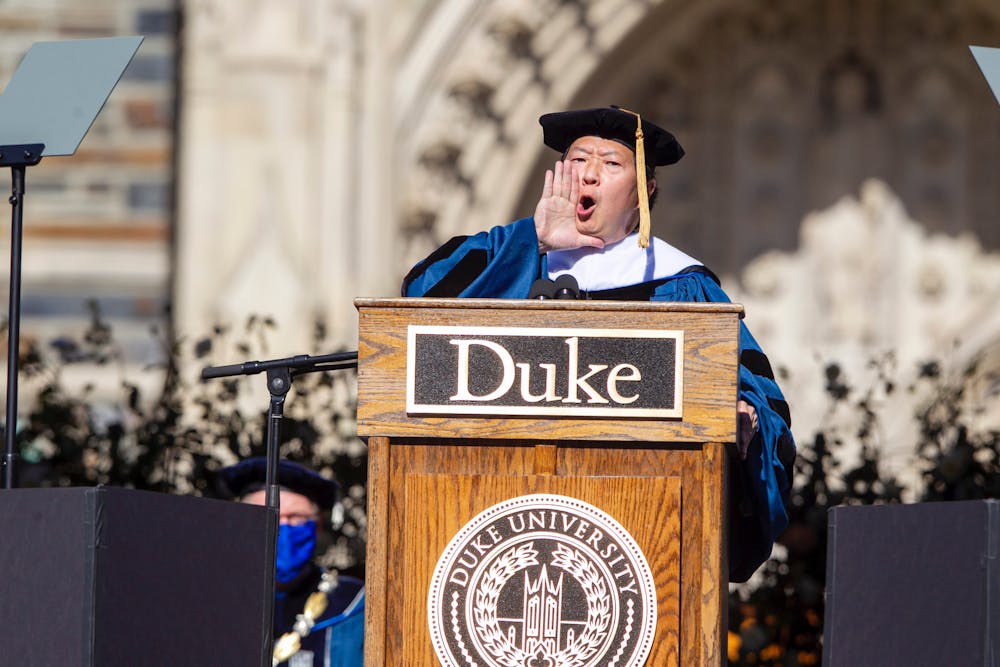Among presidents, basketball stars and Nobel Prize winners, the ranks of Duke’s most notable alumni also include “the guy from ‘that thing,’” as actor and comedian Ken Jeong jokingly describes himself.
Jeong, whose decades-long career includes such iconic roles as Mr. Chow in The Hangover movie series and Ben Chang in the hit sitcom Community, graduated from Duke in 1990 as a zoology major and worked as a physician for years before he made his first appearance on the big screen.
Years after he “got famous at 40,” Jeong sat down with The Chronicle to look back on his lasting relationship with the University where it all began.
Though he was born July 13, 1969, in Detroit, Jeong spent most of his childhood just under an hour down the road from campus in Greensboro, N.C. A high-achieving student, Jeong landed on Duke because it was “the best of both worlds” — close to home but still with the feel of a completely new experience. Add in the University’s first-rate educational opportunities and “the most beautiful campus in the world,” and attending Duke became “the dream” for Jeong.
But once he was accepted, becoming a Blue Devil opened the door for Jeong to pursue another dream — one he hadn’t previously considered.
At the time he was applying to colleges, Jeong had no intention of pursuing a career in entertainment. In fact, throughout most of his childhood, he had little experience with the arts.
However, in his senior year of high school, he participated in a male pageant hosted by his school, posing like a bodybuilder for a swimsuit competition and performing a Lionel Richie song on piano for the talent portion. It was the first time he had sung publicly — and the first time he received a standing ovation.
“It was my first taste of comedy … I’ve never experienced anything like that in my life,” he said.
Jeong referred to the pageant as his “Napoleon Dynamite moment,” explaining that the thrill of that experience “subconsciously informed” him to try out acting in college. So, while tackling the notoriously rigorous requirements of Duke’s pre-med track, Jeong decided to enroll in his first introductory acting class in the spring of his sophomore year.
Immediately, he was hooked.
Completing assignments for his acting courses “wasn’t work” for Jeong; rather, he was excited to prepare and perform something new in class each day. Decades later, he said that exhilaration hasn’t gone away.
“I just knew that this was my calling,” Jeong said. “… I think that’s why Duke is so special to me to this day, because I discovered my calling while at Duke.”
After that first class, Jeong chased any opportunity to perform. He soon joined Hoof ‘n’ Horn — a student-run acting group on campus that advertises itself as “the oldest musical theater organization in the South” — as a chorus member to take part in their 1988 performance of Kiss Me Kate. Although Jeong’s role was lineless, he was still able to steal the show in the background by “doing [his] ‘Ken Jeong thing,’” and even received some critical acclaim for the performance.
“I remember getting a nice write-up in the local paper … I actually have it in my office. It says, ‘Have I mentioned Ken Jeong, who [had] best watch his back if he keeps upstaging the principals?’” he recounted. “That was in 1988, and I still remember that. It was transformative for me.”
Jeong ended up auditioning and being accepted into Duke Drama, a highly competitive program that would have allowed him to become “fully immersed in the drama culture” on campus. But accepting the spot would mean giving up his medical studies, as he would not have enough time to commit to both pursuits.
Jeong described deciding between drama and medicine as “the toughest time in terms of [his] college life.” Ultimately, he chose to continue with zoology, explaining that it was hard to envision a future in Hollywood given the lack of Asian American representation in film at the time.
“I always make the joke that I was ‘Korean-ed’ into staying pre-med, but it was really myself,” Jeong said. “… It was really rare to have an Asian American in entertainment, and so that really dawned on me.”
Rededicating himself to his studies, Jeong put his “acting ambitions on hold” until he was accepted into medical school. Then, he took advantage of that brief period of freedom during his senior spring to perform in a one-act play.
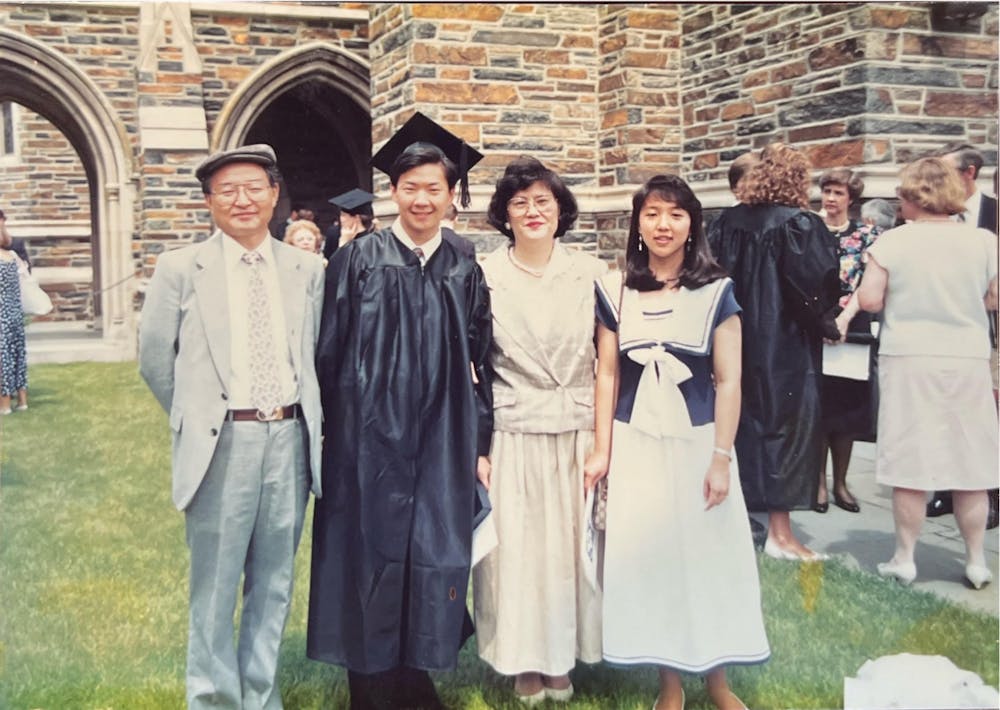
Jeong eventually decided to pursue his medical degree 12 miles down the road at the University of North Carolina at Chapel Hill’s School of Medicine — though he recalled still having a “performance bug that [he] couldn’t shake off.”
Get The Chronicle straight to your inbox
Sign up for our weekly newsletter. Cancel at any time.
Searching for performance venues, he discovered a bar in Raleigh that was hosting an open mic event and decided to try stand-up comedy for the first time. Since stand-up could be scheduled flexibly, Jeong noted that it became more feasible as a hobby as opposed to standard acting gigs.
Then, in 1995, while completing his residency in internal medicine at Ochsner Medical Center in New Orleans, Jeong’s career took a turn towards Hollywood.
He decided to enter a comedy competition called the Big Easy Laff-Off, judged by Brandon Tartikoff, the former head of Paramount Pictures, and Budd Friedman, the owner of the Improv comedy club chain. Impressed by his skills, the two judges encouraged Jeong to take his shot in Tinseltown and declared him the winner, giving the budding comedian the opportunity to perform two shows at the Hollywood Improv.
Their support, Jeong attested, was “really instrumental in giving him the confidence to pursue comedy” and ultimately “validated” his passion for the field.
So, after finishing his residency, Jeong headed west to Los Angeles, working part-time as a physician for health care provider Kaiser Permanente but still making time to perform stand-up whenever he could.
Some years later, Jeong sent in an audition tape for a supporting role in the romantic comedy Knocked Up, earning what he described as “maybe the biggest-pressure audition [he’d] ever had in [his] life.” The star-studded table read included the actors who had already been cast for the film, placing him among A-listers such as Katherine Heigl, Seth Rogen and Paul Rudd.
Despite facing initial pre-audition nerves, Jeong was able to get in a first laugh at the table read, which he recalled loosening him up and giving him the confidence boost he needed.
“It’s kind of like watching [the Dec. 4 Duke men’s basketball] game [against] Auburn: Isaiah Evans shooting one of his six threes. It just kind of loosens everybody up,” Jeong said. “It just relaxes you the rest of the game, and you perform better. That’s what happened to me. The rest of the table read, I was able to just knock it out of the park, and I got the role right after that.”
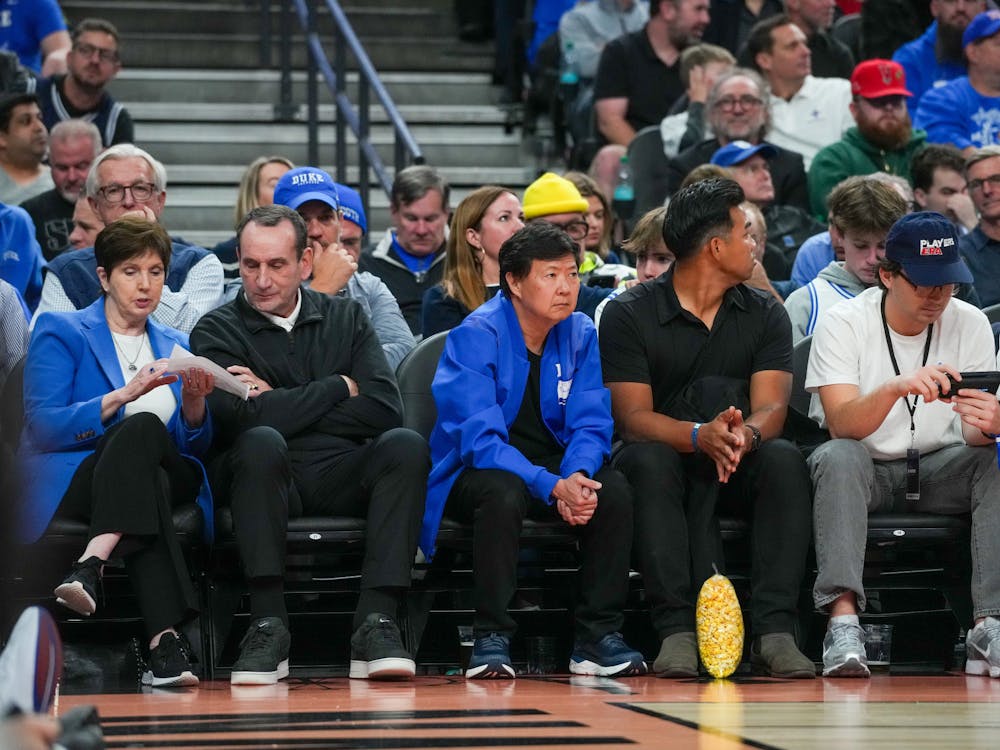
Knocked Up became Jeong’s “big break” on the silver screen. After being cast in additional films by director Judd Apatow, Jeong made the decision to quit his day job as a physician and pursue acting full time.
The actor credits his wife, Tran Ho’s, support with giving him the confidence to make the move — a conventionally risky one.
“My wife — who was a family medicine physician and still is — knew she married a comedian at heart, and she really encouraged me after filming Knocked Up,” Jeong said. “She said, ‘If you’re not going to take a shot now, you never will.’ Because of that, I got my father’s blessing because my father was like, ‘You need to have your family’s blessing; Tran is now your family. If you have her blessing, you have my blessing.’”
2007 marked a momentous year for the actor — just a week after Ho gave birth to their twin daughters, Zooey and Alexa Jeong, Knocked Up hit the big screen, and Jeong was cast soon after in the NBC sitcom Community.
But the excitement took a devastating turn in 2008 when Ho was diagnosed with breast cancer.
The news took a tremendous toll on Jeong, who became responsible for taking care of his wife and their newly one-year-old daughters while still aiming to carve out a professional acting career.
While Ho was still recovering from chemotherapy, as her tumor markers had only just normalized, Jeong received the call that he had received the part of Leslie Chow in The Hangover.
“I really was wrestling back and forth [between] not doing the movie,” Jeong said. “… It was really Tran and my mother-in-law … they were like ‘You just got to do the movie.’”
Although filming his scenes only lasted one weekend, Jeong still flew home between shoots to be with his wife as part of his deal with the studio. The only people on the Las Vegas set he had told about Ho’s condition were director Todd Phillips and starring actor Bradley Cooper, both of whom helped support Jeong through the “very, very tough time.”
“The final day of filming for me on The Hangover, Bradley himself drove me back to L.A. just to see how Tran was doing,” Jeong said, “There’s a lot of deep memories that are associated with The Hangover [for me] that have nothing to do with its commercial success. In many ways, The Hangover got me through the worst time of my life.”
Now, 16 years later, Ho remains cancer-free.
Still, The Hangover’s success has also significantly impacted Jeong’s life, to some extent serving as the launching pad for his career — and his path back to Duke. He noted that revenue from the film has given him the opportunity to offer his time and resources to make a difference in the communities he cares about, whether by supporting nonprofits like Stand Up to Cancer or his alma mater.
“The Hangover has, needless to say, opened up so many doors for me, and it’s also allowed me to have this career where I can come back full circle to Duke and give back in a way that I never thought I could,” Jeong said.
A few years later, Jeong returned to his medical roots — but this time on a film set instead of in a doctor’s office.
He began working on Dr. Ken, a sitcom starring himself as Dr. Ken Park — a physician with “questionable bedside manner.” Jeong described the two-season show, which first aired in 2015, as his favorite project to work on “because it was [his].”
“I conceived of it, I pitched it to ABC and took two years to develop it, but I was able to get an actual series. I mean, even if you get a pilot, that’s still a miracle,” Jeong said. “… That was, to me, my biggest achievement because [I] just started from scratch and was able to see it to fruition.”
Jeong executive produced and starred in the series, so when it wrapped in 2017, he recalled having some of the most free time he had had in years. He said that allowed him to reflect on his career in Hollywood and the values he hoped to prioritize moving forward.
Eventually, Jeong ran into Billy Zarzour in Los Angeles, who was with the Iron Dukes at the time and now serves as director of major gifts for Duke Athletics. Zarzour suggested they return to campus and attend a men’s basketball game in Cameron Indoor Stadium together — which ended up being a thrilling comeback Blue Devil victory over their Tar Heel rivals.
But it wasn’t just the nail-biting victory that made the night so memorable for Jeong — the game also served as an emotional homecoming, becoming just the first of many for the actor.
“It was my first time back in Cameron in [years],” Jeong said. “… To get that energy from the crowd and for the crowd to recognize me, I started tearing up because I was one of them … You know, I’ve done stand-up comedy and sold out theaters, but I have never experienced that kind of rush of intense joy that I do whenever I go back to Cameron.”
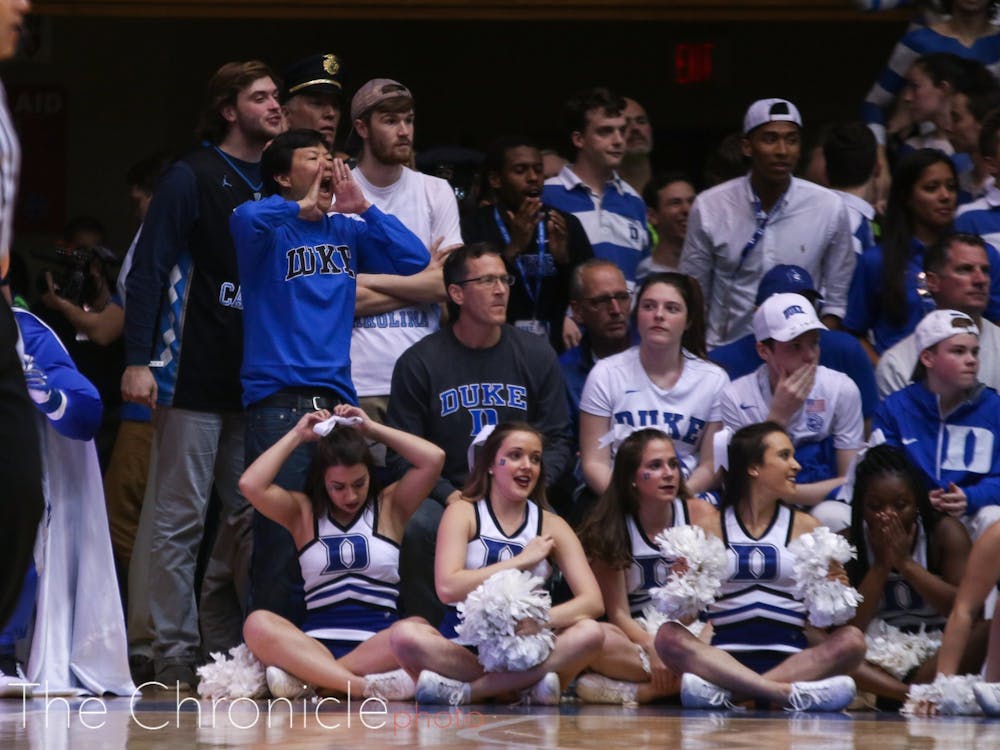
Jeong recounted his experience of being a Cameron Crazie during his time as a student, explaining that he would “go to every Cameron game as [his] schedule would allow,” sometimes by himself if none of his friends were available.
That March 2018 rivalry game marked his triumphant return to his Blue Devil roots, 28 years after crossing the graduation stage — ultimately motivating Jeong to begin “integrating more Duke” into his life.
“Everything that I enjoy right now, it started at Duke,” Jeong said. “… I have this really unconditional love and support [for] what I did at Duke … and that’s why I give back to this day.”
As such, the alumnus has become a campus regular, participating in many monumental University events in recent years.
He agreed to give the commencement address for the Class of 2020, but after the ceremony was delayed due to the COVID-19 pandemic, Jeong performed the honor the following year in front of the iconic Duke Chapel.
Jeong described the moment as “easily one of the highest points of [his] life.”
In January, he returned to Cameron Indoor to host the University’s Centennial Celebration Kick-Off event alongside Lisa Borders, Trinity ‘79 and former president of the Women’s National Basketball Association, and former men’s basketball coach Mike Krzyzewski. The 1990 graduate has become a familiar face on campus this year as Duke continued to commemorate its 100th anniversary with a slew of other events, occasions Jeong rebranded as part of the “Ken-tennial.”
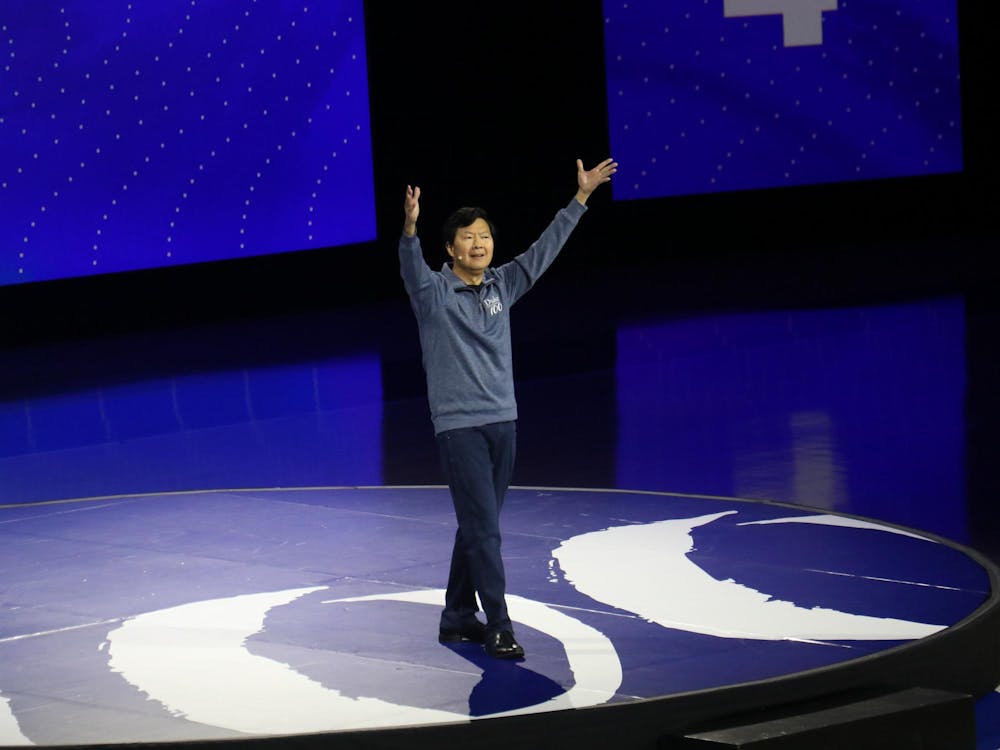
The actor maintains a close relationship with the Duke Arts program in particular. He shared that he has hosted several one-on-one Zooms and events for alumni hoping to make their way in the entertainment industry, offering his advice and a sense of support in what he acknowledged can be a difficult and isolating field.
“[I’m] just telling them ‘I’m here for you, and if you don’t need me, fine, but I just want you to know that if you have any questions of any kind, I’m here for you,’” Jeong said. “… I definitely want to be a resource as much as I can, especially for recent graduates because it’s just a scary world out there, and it’s so easy to lose a sense of perspective.”
Jeong praised the “well-rounded education” he received at Duke and encouraged today’s students to allow for “outside-of the box thinking” and “find art in everything [they] do” — even those who are not intending to go into a creative field.
“Medicine in many ways is improv, because there’s an algorithm of how to treat a patient, and there’s so many different timelines, so many different options,” he said. “… In other words, you have to have a very nimble mind, which is what improv is.”
Jeong has also played to those improvisatory strengths throughout his acting career in comedic roles like Ben Chang in Community’s six seasons and a movie or as Wye Mun Goh in the 2018 blockbuster Crazy Rich Asians, as well as by entering the reality TV scene as a judge for all 12 seasons of The Masked Singer.
Although comedy has long been his acting “niche,” Jeong has also stepped into some dramatic roles in recent years.
In the aftermath of the COVID-19 pandemic, Jeong accepted a part in the 2023 film A Great Divide, which deals with xenophobia and Asian hate crimes. His newest project, courtroom drama series Accused, was recently released on Fox and Hulu. There, Jeong plays a person accused of murder, and he described the experience as “really intense” and “dark” but also his “favorite dramatic lead role on television” because “it was completely different from who [he is].”
“There’s no way I could have done this particular project 10 years ago, even if I had the technique and the skill, even if I could do it by the book. I could do it by the book, it just wouldn’t have been as good,” he said. “… In many ways, this role was kind of a culmination of my life’s work and my life’s experiences.”
Reflecting on what has blossomed into a dynamic career, Jeong noted that achieving fame has never been his goal. Even as a young pre-med student and fledgling comic at Duke, “all [he] ever wanted to be was a character actor” — not the guy that’s famous, but the one that makes the audience laugh.
“My dad famously told me, ‘If you go and do this for a living, do not seek fame. Just be good at your craft … don’t seek anything else. Acting is not about fame,’” he recounted. “That’s the best advice anyone could tell me: Just be passionate about what you do.”
Although Jeong may have not searched for fame, he has certainly found it in spades. This past October, he earned a star on the Hollywood Walk of Fame, paying homage to years of talent and hard work. For Jeong, the honor represented more than just a momentous point in his career; it also served as a testament to the passion he has for his art and the connection he has built with his audiences.
“It’s not about me; it’s about the fans and it’s about people accepting my work and accepting me as an entertainer,” Jeong said. “… Since this is beyond my goals, I have no more goals but just to continue to work and keep doing what I do. … That’s the true reward. If I keep doing my thing and going with the flow, good things will happen.”
As he looks to what’s next, Jeong is approaching the future with an open mind and appreciation for how far he’s come — and as always, he’s thanking Duke for giving him the skills to navigate each new challenge and opportunity.
“It’s okay to feel what you feel, but at the end of the day, don’t be afraid. I think one has to go through certain phases of even insecurity and self-doubt. That’s part of growing up; that’s part of the process,” he said. “Maybe the take-home point is everything will be alright. In the end, everything will be okay because you went to Duke.”
Zoe Kolenovsky contributed reporting.
Sarah Diaz is a Trinity first-year and a staff reporter for the news department.

